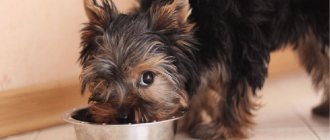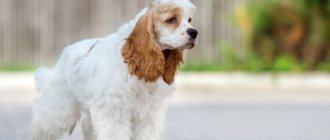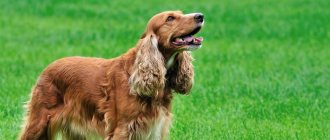When choosing a future pet, many people choose the Cocker Spaniel breed. This is not surprising, because puppies of this breed look very funny and cute. It's no secret that most buyers fall in love with such animals literally at first sight. A unique intelligent look, a funny “skirt”, an actively moving tail and an incredibly friendly character - all this beckons and attracts you. However, do not think that puppies and adults remain simpletons. When a threat appears, they can defend the owner and his environment, fighting until their last breath. It is not for nothing that this dog was often used for security and hunting purposes.
Cocker spaniel - features of the breed
The Cocker Spaniel is a fairly ancient breed of dog bred for gun work. There are about 20 types of spaniels in the world, but only two of them are “cockers”:
- American Cocker Spaniel.
- English cocker spaniel.
What are the characteristics of the breeds, similarities and differences? Cocker spaniels are medium-sized dogs, weighing between 10 and 14 kg. Adult animals develop dense, water-repellent fur. Both cockers readily fetch, are active and curious even into old age.
- Dogs differ in temperament, American spaniels are more sofa-like. They have longer and softer fur.
- English spaniels are stronger, stockier, more resilient, and physically stronger.
Choosing a place and dishes for feeding a Cocker Spaniel puppy
Before moving your puppy to a new home, there are key things you need to take care of that will reduce stress and increase the comfort of your new pet. If the dog is not acquired spontaneously, take care of:
- Equipment for rest areas.
- Purchasing toys.
- Choosing and purchasing care accessories.
- Choosing a place and utensils for eating.
To maintain cleanliness in the eating area, it is recommended to use a special rubberized mat. The accessory helps protect the puppy from falling, even if the floor is wet. The mat is easy to wash and disinfect. Instead of special mats, you can use a structural, dense film.
Important! In order for a Cocker Spaniel puppy to properly develop its bone structure, it must be taught to eat from a stand. Special stands are height adjustable. Bowls need to be narrowed so that the dog’s ears do not get dirty while eating.
Factors influencing growth
Height and weight gain of cocker spaniels depend on a number of factors:
- Heredity. This means not only a genetic predisposition to specific diseases, congenital pathologies, but also the parameters of ancestors. Large parents are more likely to produce large offspring than miniature representatives of the breed.
- Conditions for keeping a mother dog during pregnancy and her offspring. A pregnant dog or puppies need a calm, cozy, quiet and warm place without drafts, high humidity, or noise. Stress from unfavorable living conditions can affect the development of animals. Factors such as time of year, climate, and environmental conditions also have their influence.
- Balance, calorie content of the mother’s diet, timely introduction of complementary foods for the offspring. A pregnant dog should receive increased portions of high-calorie food on a strict schedule - it is best to stick to the menu compiled by the veterinarian. Do not forget to introduce complementary foods to puppies on time - first liquid, and then solid. Monitor their reaction to new food.
- Portion size, harmony of diet components, frequency of meals. Consult your veterinarian about your little spaniel's diet.
- Physical exercise. A growing organism must constantly move, run, play and frolic in order to develop harmoniously. However, exhausting activities and activity after a full lunch, on the contrary, harm the cubs.
What to feed a Cocker Spaniel puppy - choosing the type of diet
When choosing what to feed your Cocker Spaniel puppy, you need to decide on a key area – the type of diet:
- Natural.
- Industrial.
- Mixed.
All three types have advantages and disadvantages. Let's look a little more closely.
Natural diet
The more natural diet for a Cocker Spaniel puppy has always been and remains natural products. A natural diet for a Cocker Spaniel puppy includes:
- Feeding raw and cooked foods.
- Feeding meat porridge.
- Feeding exclusively raw foods is a raw food diet.
Benefits of a natural diet for a Cocker Spaniel puppy:
- High-quality natural products can be given to your puppy from a very early age.
- A natural diet is cheaper than high-quality industrial feed.
- You can always control the quality and freshness of products.
- The natural diet can be adjusted at any time.
- Taste variety.
Disadvantages of a natural diet for a Cocker Spaniel puppy:
- You need to spend time preparing food for your dog.
- Porridge and other natural products should not be left in a bowl for the dog to eat during the day.
- The puppy may develop an allergy, although cocker spaniels are not prone to this disease.
A cocker spaniel puppy can be switched to natural products from the age of one month . If the puppy is orphaned, it can be fed with special formulas based on milk, glucose, eggs (and other options) or homemade goat milk.
Ready-made feed
Ready-made food for a Cocker Spaniel puppy is an excellent and sometimes the only alternative for working owners. Having opted for an industrial diet, you need to understand the nuances. Ready-made food for Cocker Spaniel puppy is divided into types:
- Dry (granules).
- Semi-moist (pieces with gravy).
- Moist (pate or paste).
- Treats.
Naturally, the main indicator that you need to focus on when choosing food is quality. Industrial food for Cocker Spaniel puppy is divided into classes:
- Economy
- Premium
- Super premium.
- Holistic.
If your dog has individual characteristics, you need to choose specialized food lines.
According to their intended purpose, ready-made feeds are divided into:
- Everyday.
- Supportive.
- Preventive.
- Medicinal.
- For exhausted animals.
- Hygienic (usually treats).
Advantages of ready-made feeds:
- No need to cook.
- They are stored for a long time.
- Easy to dose.
- High-quality feed contains enough proteins, vitamins and minerals.
Disadvantages of ready-made feeds:
- Good food is more expensive than natural feeding.
- Holistic class food is almost never sold in retail.
- Expensive food is often counterfeited.
- A Cocker Spaniel puppy should not be switched to dry food until its teeth change.
- The dog should not be fed only dry or only wet food.
A cocker spaniel puppy can be switched to high-quality, canned food from 1–1.5 months of age. To feed puppies from birth, a substitute for bitch's milk is used - ready-made food in the form of a powder that is diluted with water.
Mixed diet
A mixed diet is the simultaneous feeding of prepared and natural products. Within the framework of mixed feeding there are:
- Mixing food - dry or soaked dry food and natural products.
- Separate feeding - for example, dry food in the morning, porridge in the evening.
Benefits of a mixed diet:
- Owner convenience.
- Quick satiation of the pet.
Flaws:
- The threat of vitamin deficiency when using low-grade feed.
- The threat of excess vitamins and an allergic reaction to proteins when using high-quality food.
- Dysbacteriosis, indigestion.
- Gaining excess weight.
Important! A Cocker Spaniel puppy can be switched to mixed feeding no earlier than 4–5 months of age. However, veterinarians and feed manufacturers do not recommend a mixed diet.
Character and psychology
Activity, kindness and tenderness make cockers ideal dogs for living in a large family.
- Easy to learn. These dogs have a lively mind and a desire to obey, that is, the cocker does not need to repeat something twice, he will happily carry out the learned command immediately, like, for example, dogs of the Cavalier King Charles Spaniel .
- Attachment. Spaniels love all family members very much, but they become attached with all their hearts to only one. Moreover, if you do not teach your dog some independence from childhood, such love can turn out to be a very obsessive addiction.
- Sense of humor. Cockers understand when their owners are making fun of them in a kind way, and willingly take part in such games. Moreover, the dogs themselves are cunning and have fun from the heart.
Holiday party for cocker spaniel and his cheerful friends
- Activity. These Englishmen will support any initiative to play with great pleasure, and thanks to their intelligence and sense of humor they will turn any entertainment into an interesting adventure.
- Good memory. It will help the dog adapt to any conditions and quickly learn new rules. This is especially appreciated if you need to temporarily move your dog, for example, to a country house.
- Love for children. Well, who can you play with for hours if not with children?! Moreover, the English Spaniel dog is non-aggressive and angelically patient; she will not bite the baby, even if he hurts her. It is now the responsibility of the parents to explain to the little one that the dog must be treated with care.
With a cocker spaniel, the lambs will not only be safe, but also well-fed
- Friendliness. Having fulfilled his canine duty - barking at the guests, after some time the cocker will have fun playing with them, like a Groenendael or Kuvasz . The same applies to other animals.
Sample menu by age for a Cocker Spaniel puppy
In theory, everything looks a little more complicated than in practice. By creating an approximate menu for a Cocker Spaniel puppy by age, you can soberly assess your capabilities and benefits for your pet.
Menu for a Cocker Spaniel puppy up to a month old
Until the age of one month, a Cocker Spaniel puppy feeds only on its mother's milk. If, for some reason, the puppy is left without a mother, he is fed artificially:
- Natural menu for a Cocker Spaniel puppy under one month of age – homemade milk diluted with water; special milk mixtures.
- Industrial menu for a Cocker Spaniel puppy up to a month old - bitch's milk substitute, infant formula without additives.
The serving size for a Cocker Spaniel puppy under one month of age depends on the size and individual characteristics. Number of feedings for a Cocker Spaniel puppy under one month of age:
- From birth to 2 weeks, Cocker Spaniel puppies eat every 2 hours.
- From 2 to 4 weeks of age, Cocker Spaniel puppies eat every 2–3 hours, with a nighttime break lasting 4–6 hours.
Serving size and number of meals may vary depending on the fat content and nutritional content of the mother's milk. Naturally, the more puppies in the litter, the more often they eat.
At 1 month of age
At 1 month, Cocker Spaniel puppies are ready for complementary feeding. As soon as the babies open their eyes and begin to leave the nest, they are offered natural or industrial complementary foods.
Natural menu for a 1 month old Cocker Spaniel puppy:
- Mother's milk.
- Whole goat or cow's milk.
- Low-fat broth.
- Boiled minced meat mixed with broth.
Industrial menu for a 1 month old Cocker Spaniel puppy:
- Bitch milk substitute.
- In case of growth retardation - pate for emaciated puppies.
Serving size depends on growth rate. Usually, per day, puppies eat as many grams of food as they weigh.
The number of feedings (complementary feeding) is 5–6 times a day, excluding mother’s milk.
At 2 months
At 2 months, the Cocker Spaniel puppy actively eats complementary foods, since it has a full row of baby teeth. The more nutritious and high-quality complementary foods, the less mother’s milk babies eat.
Natural menu for a 2 month old Cocker Spaniel puppy:
- Mother's milk.
- Whole cow's or goat's milk.
- Calcined cottage cheese.
- Dairy products.
- Bouillon.
- Boiled minced meat.
- Ground, raw, boiled meat.
Industrial menu:
- Bitch milk substitute.
- Canned food for medium breed puppies.
Serving size directly depends on body weight.
The number of feedings varies from 4 to 6 times a day, excluding mother's milk consumed.
At 3 months
At 3 months, the menu of a Cocker Spaniel puppy is actively expanding. Immediately after the move, the type and schedule of feeding do not change for 10–14 days, after which the diet is expanded according to the usual scheme.
Natural menu for a 3 month old Cocker Spaniel puppy:
- Mother's milk (if the puppy is still with its mother).
- Whole milk, fermented milk products, cottage cheese.
- Boiled minced meat, raw, chopped meat.
- Broth, vegetable soup with meat broth.
- Raw quail eggs. Chicken eggs: yolk only, boiled or in the form of an omelet.
- Rice, buckwheat.
Industrial menu:
- Bitch milk substitute.
- Canned food for medium breed puppies.
- Semi-moist food for medium breed puppies.
The portion size at 3 months of age is constantly increasing.
Number of feedings: 4–5 times a day.
At 4–6 months
At 4–6 months of age, Cocker Spaniel puppies are very active and therefore require a calorie-rich diet. In addition, during this period, baby teeth begin to change to molars, so vitamin supplements are introduced into the diet, if this has not been done previously.
Natural menu:
- Whole milk, fermented milk products, cottage cheese - in large quantities.
- Boiled and raw meat without fat and bones - beef, veal, rabbit, turkey, quail.
- Beef by-products, boiled, chopped. You can use peeled, washed tripe in its raw form.
- Chicken and quail eggs – raw, boiled, omelet.
- Cereals – buckwheat, rice, barley, wheat and barley.
- Vegetables – boiled with porridge, raw with meat or cottage cheese.
Industrial menu:
- Pates for medium breed puppies.
- Semi-moist food for medium breed puppies.
- Soaked dry food for medium breed dogs.
The size depends on the individual characteristics and taste preferences of the dog. Number of feedings: 3-4 full meals and 2-3 snacks.
From 6 months to 1 year
At the age of 6 months to 1 year, the diet of a Cocker Spaniel puppy expands as much as possible. You will notice that your dog now has favorite foods; they need to be included in the diet.
Natural menu:
- Meat – beef, poultry, rabbit.
- Meat by-products – beef, poultry.
- Milk (unless lactose intolerant).
- Fermented milk products - any, preferably homemade.
- Fish – low-fat, oceanic, peeled, boiled.
- Fish and meat broths.
- Chicken and quail eggs.
- Cereals – buckwheat, rice, barley, wheat and barley.
- Vegetables except boiled potatoes and raw cabbage.
- Fruits, except juicy and very sweet.
- Greens, grass, bran.
Industrial menu:
- Until the complete change of teeth (7–8 months) – wet and semi-moist food for medium breed puppies, soaked dry food.
- After a complete change of teeth - 75% dry and 25% wet or semi-moist food for medium breed dogs.
The serving size gradually increases, then, from the age of 8–9 months, it decreases. The number of feedings is gradually reduced to 2–3 times.
Important! The final serving size for a Cocker Spaniel puppy is determined individually, depending on the dog’s metabolic rate and lifestyle.
Vitamins and supplements in the diet of a Cocker Spaniel puppy
From a very early age, vitamins and supplements are introduced into the Cocker Spaniel puppy's diet. This measure is not relevant if the dog regularly eats high-quality, industrial food. If your pet’s diet is natural, no matter how high-quality it is, additional sources of nutrients are needed.
Natural vitamin supplements for Cocker Spaniel puppy:
- Meat and bone meal.
- Clean, dried, crushed egg shells.
- Bran.
- Fish, chicken, beef liver.
- Greens, vegetables, fruits.
- Sunflower oil, olive oil.
- Brewer's yeast.
Pharmacy vitamin supplements for a Cocker Spaniel puppy can and should be used as complex sources of nutrients:
- Fish fat.
- Feed tricalcium phosphate.
- Omega-3, Omega-6.
- B vitamins.
- Undevit and analogues.
When feeding natural food, veterinarians recommend giving your Cocker Spaniel puppy special, industrial vitamin complexes. Complexes need to be changed and alternated according to needs.
Prohibited Products
It is important to exclude prohibited foods from your Cocker Spaniel puppy’s diet:
- Bones, pure fat, skin, especially poultry.
- Palm oil.
- Grapes, raisins.
- Soy.
- Mushrooms.
- Corn and semolina.
- Raw freshwater fish.
- Dry, salted fish.
- Products containing sugar or sugar substitutes.
- Products containing xylitol (chewing gum, some sweets).
- Products containing flour or yeast.
- Products containing caffeine, cocoa, any stimulants (sweets, tea, coffee, chocolate).
- Products containing marinades, salt, spices.
- Smoked products, including sausages, balyki, fish.
- Expired products.
- Leftovers from the table.
Controversial foods in a puppy's diet are:
- Lean raw pork.
- Raw ocean fish.
- Whole milk.
- Honey.
- Chicken eggs.
- Raw and boiled chicken liver in large quantities.
Controversial products can and should be given to a Cocker Spaniel puppy if an allergic or other acute reaction does not occur after taking them.
How to feed the smallest pet
A one and a half month old puppy is an actively developing organism that requires proper nutrition and handling.
At this age, your pet should be given a little more than half a glass of food. As you grow older, the daily norm is increased to one glass. Don't forget to monitor the animal's behavior. If it greedily eats a portion and “chases the bowl,” most likely the portion is too small or the gap between feedings is too long. If the puppy eats slowly and carefully, periodically moving away from the bowl, most likely there is too much food or frequent feeding. If your tummy becomes bloated after eating , it can be explained by overeating.
Give food and water in two bowls with a smooth surface. It is important to eliminate the possibility of tongue damage. In addition, a bowl of water must be placed constantly, and with food - only according to the feeding schedule. Uneaten food should be removed by placing it in a jar or refrigerator until the next meal. It is important to pay attention to the temperature of the food - the optimal temperature should be about 40 degrees.
Feed your puppy from a small but securely fixed stand with adjustable height. The dog should reach for the bowl, but not lower its head down. The ideal option for a cocker is presented in the form of a stand made of a metal hoop with legs. In this case, the long ears hang over the edges of the bowl, which saves you from having to wash your pet's ears after eating.
Try to follow the feeding schedule exactly.
Do not forget that food intake should be carried out only at specific hours. Temporary “snacks” should not be allowed, otherwise instead of an obedient pet you will grow up to be a beggar. And all spaniels , including representatives of the Russian breed, are prone to obesity.
If your pet refuses to eat a specific food, you cannot replace it with another. Just put the bowl away and wait for your next meal. If you ever make a mistake, it will lead to the development of moody behavior. The puppy will quickly understand that it is enough to break a little, and his demands will be satisfied.











